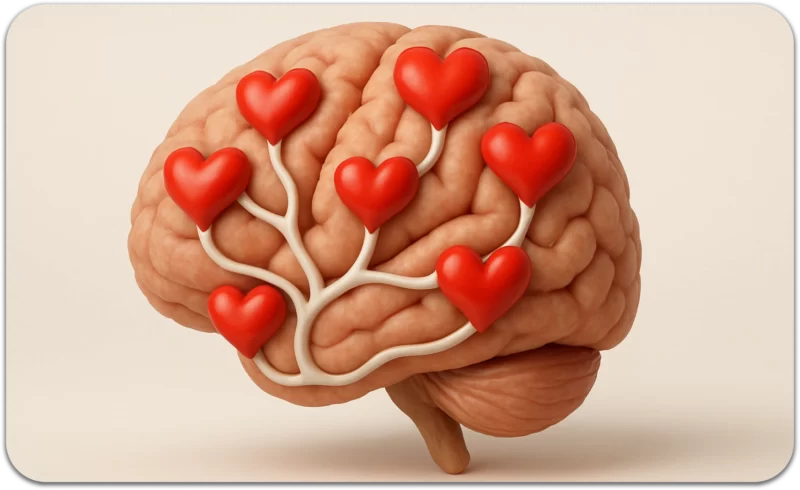
Key Takeaway: Falling out of affection isn’t simply emotional, it’s organic. When dopamine fades and stress hormones rise, relationships endure. However right here’s the hopeful half: by way of neuroplasticity and {couples} remedy, your mind can actually rewire itself to really feel love once more. This text explores the science behind why we fall out of affection and the confirmed therapeutic approaches that may enable you reconnect.
Ah, love, that magical mixture of butterflies, late-night texts, and pretending you truly like their favourite band. At first, all the things feels cinematic. However someplace between “I can’t cease excited about you” and “Why do you breathe so loud?” one thing shifts. You may end up falling out of affection, and it will probably really feel complicated and painful.
It’s not that you simply immediately cease caring, it’s that your mind chemistry adjustments. Falling out of affection isn’t simply an emotional story; it’s additionally a organic one rooted in neuroscience and attachment patterns.
The Mind on Love: Nature’s Most Addictive Drug
Whenever you first fall in love, your mind throws a full-blown chemical get together. Dopamine (the “pleasure” chemical) lights up your reward system each time you see or hear out of your associate. Add a touch of norepinephrine (the joy hormone) and a heavy pour of oxytocin (the cuddle chemical), and immediately you’re within the throes of what scientists name “romantic love”, and what your mates name “being obsessed.”
Analysis printed within the journal Mind Sciences confirms that the coordination of oxytocinergic and vasopressinergic pathways, coupled with the dopaminergic reward system, contribute to the formation and upkeep of each maternal and passionate love. Principally, early love is the mind’s model of a chemical binge, all thrill, no chill.
The Science Behind the Spark
The ventral tegmental space (VTA) and nucleus accumbens; key areas in your mind’s reward circuit, grow to be hyperactive throughout early love. Georgetown College neuroscience analysis reveals this activation is much like what occurs with extremely rewarding stimuli, explaining why new love feels so intoxicating.
The Come-Down: When the Excessive Wears Off and You Begin Falling Out of Love
Sadly, the mind can’t hold partying perpetually. Over time, it adapts, dopamine receptors cease firing at full blast, and that rush of pleasure begins to fade. That is known as hedonic adaptation, which is science’s well mannered means of claiming, “you bought used to it.”
What as soon as made your coronary heart skip now simply… exists. You begin noticing little annoyances (why do they breathe so loud once more?) as a result of your mind isn’t operating on pure dopamine anymore. This organic shift is a major motive why individuals expertise falling out of affection, even after they nonetheless care deeply about their associate.
Feeling emotionally disconnected out of your associate? Study efficient methods with our article on what {couples} who keep collectively do each day to keep up emotional connection.
Stress Enters the Chat: Cortisol Crashes the Occasion
Because the honeymoon glow fades, actual life rolls in, payments, chores, emotional baggage, and together with it comes cortisol, the stress hormone. When stress rises, oxytocin (your bonding hormone) drops. The mind’s alarm system, the amygdala, turns into extra lively, and immediately your associate’s quirks begin feeling like private assaults.
This isn’t as a result of love disappeared, it’s as a result of stress hijacked the chemistry that retains you related. Research counsel that continual stress (by way of cortisol) could disrupt oxytocin and bonding pathways, weakening emotional closeness.
Serotonin and the Finish of Obsession
Whenever you first fall in love, serotonin ranges drop, making you consider your associate consistently. (Sure, love makes you slightly obsessive, it’s biology, not insanity.) However as the connection settles, serotonin balances out. The fixation fades, and also you begin noticing different issues: your wants, your targets, your sleep schedule.
That shift can really feel like falling out of affection, however in lots of circumstances, it’s your mind simply discovering steadiness once more. Understanding this organic actuality might help {couples} normalize what they’re experiencing moderately than decoding it as relationship failure.
Fast Science Reality:
A examine by Marazziti et al. discovered that individuals in early romantic love had diminished platelet serotonin transporter density, ranges much like these seen in unmedicated OCD sufferers
Withdrawal: When Love Ends (and It Feels Like You’re Dying)
Breakups, and even emotional distance, can really feel bodily painful as a result of your mind goes by way of withdrawal. Those self same dopamine and oxytocin pathways that when fired with pleasure immediately go quiet. It’s why we crave contact, even once we understand it’s not wholesome.
However right here’s the hopeful half: your mind heals. By neuroplasticity, the mind’s skill to rewire, new sources of connection and pleasure ultimately type. Analysis on neuroplasticity demonstrates that you simply actually can really feel that spark once more, generally even with the identical individual.
How Remedy Can Assist When You’re Falling Out of Love
Right here’s the half many individuals don’t notice: remedy isn’t only for breakups, it’s for makeups. Whenever you’re experiencing falling out of affection, skilled assist may be transformative.
{couples} therapist can act like a information to your nervous techniques, serving to you each be taught to attach once more as a substitute of defaulting to outdated defenses. Emotionally Targeted Remedy (EFT), which is grounded in attachment principle, has been proven to be extremely efficient for {couples} experiencing emotional disconnection.
How Remedy Rewires Your Mind for Love
Creates emotional security: Whenever you really feel heard as a substitute of blamed, the mind naturally shifts from protection mode to connection mode
Reduces cortisol (stress): Studying higher communication and emotional regulation expertise lowers stress hormones
Boosts oxytocin: Small moments of eye contact, shared laughter, or vulnerability can reignite bonding hormones
Prompts neuroplasticity: Therapeutic relationships might help type new neural pathways over time, as proven in neuroimaging research of psychotherapy.
In remedy, companions expertise emotional security, and that’s when oxytocin (the bonding hormone) begins flowing once more. Remedy additionally helps scale back cortisol (stress) by instructing higher communication and emotional regulation expertise. Small moments of eye contact, shared laughter, and even vulnerability can reignite dopamine, reminding your mind why you fell in love within the first place.
The Position of Attachment in Falling Out of Love
Analysis reveals that early caregiving experiences form grownup romantic attachment kinds (safe, anxious, avoidant, disorganized), which affect how individuals assume, really feel, and relate in relationships.
Remedy helps {couples} transfer from insecure attachment patterns towards earned safe attachment, the place each companions really feel secure expressing vulnerability and responding to one another’s wants. This transformation doesn’t simply enhance emotions, it actually adjustments mind construction by way of repeated optimistic interactions.
The Takeaway: Falling Out of Love Doesn’t Imply Failure
Falling out of affection doesn’t imply you’ve failed, it means your mind is doing what it’s designed to do: adapt and search steadiness. However simply because the mind can unlearn closeness, it will probably relearn it, too.
With care, curiosity, and generally the steerage of an excellent therapist, the chemistry of affection can evolve, not again to the dizzying early rush, however towards one thing deeper, calmer, and extra actual. {Couples} counseling affords a number of pathways to rebuild connection, from bettering communication to addressing underlying trauma.
Indicators You May Profit from {Couples} Remedy:
You are feeling emotionally disconnected out of your associate
Arguments escalate shortly or lead nowhere
You’re contemplating separation however nonetheless have hope
Life stressors are straining your relationship
You need to forestall small points from changing into main issues
You’re able to spend money on your relationship’s future
As a result of love isn’t only a feeling, it’s a relationship between two nervous techniques studying to really feel secure once more. And with the suitable assist, that security may be rebuilt, one second of connection at a time.
Able to Reconnect and Rebuild Your Love?
You don’t need to navigate falling out of affection alone. Skilled {couples} remedy might help you perceive the neuroscience behind your disconnection and supply sensible methods to rebuild emotional intimacy.
The previous article was solely written by the writer named above. Any views and opinions expressed usually are not essentially shared by GoodTherapy.org. Questions or issues in regards to the previous article may be directed to the writer or posted as a remark beneath.




